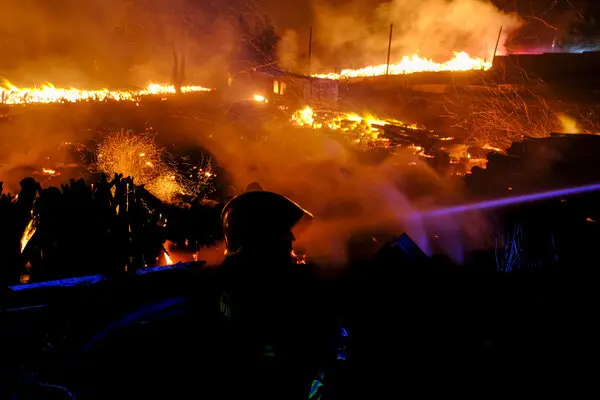In a tragic turn of events, central Chile, particularly the densely populated Valparaiso region, is grappling with devastating wildfires that have claimed the lives of at least 46 individuals, as announced by President Gabriel Boric on Saturday evening. The catastrophic fires have left over 1,100 homes in ruins, prompting urgent calls for evacuations and heightening concerns about the ongoing firefighting efforts.
President Boric, in a somber address, expressed deep concern about the escalating casualty count and the challenging conditions that are hindering rescue operations. The Valparaiso region is facing four significant fires that continue to rage, making it difficult for firefighting teams to access vulnerable neighborhoods. The president urged citizens to cooperate with rescue workers and emphasized the critical importance of timely evacuations.
“If you are told to evacuate, don’t hesitate to do it,” President Boric urged the residents. “The fires are advancing fast, and climatic conditions have made them difficult to control. There are high temperatures, strong winds, and low humidity.” The dire situation necessitates swift and decisive action to ensure the safety of residents and emergency responders.
Widespread Devastation and Ongoing Threat:
The scale of destruction caused by the wildfires is staggering, with over 1,100 homes reported as destroyed. The fires have not only claimed lives but have also left communities in disarray, with countless individuals facing the loss of their homes and possessions. The impact on Valparaiso, known for its picturesque coastal landscapes, is particularly severe, as the fires threaten the well-being of its residents.
Interior Minister Carolina Tohá provided alarming statistics, stating that 92 forest fires were burning across central and southern regions of Chile. Unusually high temperatures during the week exacerbated the fires, creating a challenging environment for containment efforts. The Valparaiso region witnessed the most fatal incidents, prompting authorities to strongly advise the evacuation of thousands of residents from their homes.
Challenges in Containment Efforts:
Efforts to contain the wildfires are hampered by the unpredictable nature of the fires and the harsh climatic conditions. Two fires near the towns of Quilpué and Villa Alemana have already burned through at least 8,000 hectares (19,770 acres) since Friday. Additionally, one of the fires poses a significant threat to the coastal resort town of Viña del Mar, where some neighborhoods have already been severely affected.
Villa Independencia, a hillside neighborhood on the eastern periphery of Viña del Mar, has suffered extensive devastation. Multiple blocks of residences and businesses have been reduced to ruins, leaving residents grappling with the sudden and overwhelming loss. The fires spread rapidly, forcing residents like Rolando Fernández to flee for their lives. Fernández, who lost his home, expressed the shock of witnessing the fire engulf his community within minutes.
“I’ve worked my whole life, and now I’m left with nothing,” said Fernández, encapsulating the despair felt by many affected by the wildfires.
Emergency Response and Evacuation Measures:
To address the crisis, authorities have established three shelters in the Valparaíso region. A comprehensive effort is underway, mobilizing 19 helicopters and over 450 firefighters to combat the raging blazes. However, the challenging terrain, which includes mountains and precarious neighborhoods on the outskirts of Viña del Mar, poses significant obstacles to containment efforts.
Residents in regions not directly affected by the fires have been instructed to remain in their homes. This measure aims to facilitate the movement of essential emergency vehicles, including fire engines and ambulances, ensuring efficient access to affected areas. The directive underscores the need for coordinated responses to manage the crisis effectively.
Impact on Infrastructure and Essential Services:
The fires have not only devastated homes but have also led to power blackouts and the evacuation of critical facilities. In the Valparaíso region, four hospitals and three nursing homes for the elderly had to be evacuated due to the advancing fires. The destruction extended to infrastructure, including two bus terminals, highlighting the multifaceted impact of the crisis.
Climate Crisis Amplifies Risks:
The El Niño weather phenomenon, prevalent this year, has contributed to droughts and elevated temperatures along the western region of South America. This climatic condition intensifies the threat of forest fires, exacerbating the challenges faced by authorities in Chile. The consequences of the climate crisis were already evident in January when over 17,000 hectares (42,000 acres) of forests in Colombia were ravaged by fires.
As central Chile grapples with the destructive wildfires, the urgent need for enhanced disaster management strategies and climate resilience measures becomes increasingly apparent. The crisis highlights the interconnectedness of environmental factors and the imperative to address the underlying challenges posed by a changing climate.
The wildfires in central Chile underscore the vulnerability of communities in the face of natural disasters and the importance of swift, coordinated responses. The immediate focus is on containing the fires, ensuring the safety of residents, and providing essential support to those affected. However, the broader conversation must also address the need for proactive measures to mitigate the impacts of climate change and build resilience in the face of escalating environmental risks.
